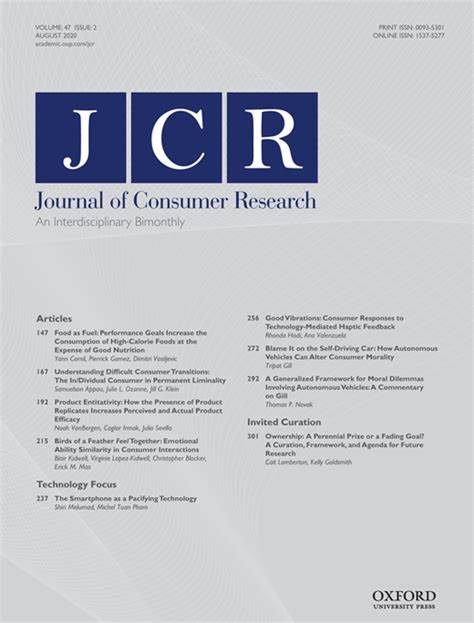Moralizing Everyday Consumption: The Case of Self-Care
IF 6.4
1区 管理学
Q1 BUSINESS
引用次数: 0
Abstract
Morality, appraisals of right and wrong, is central to consumers’ identities and decisions. Even everyday consumption choices can be subject to moral judgments and require moral justifications. When and how do consumers moralize formerly taken-for-granted consumption practices? Considering self-care consumption in the United States, which includes practices that range from bathing to dieting to meditating to vacationing, this paper examines the moralization of everyday consumption practices. This research reveals that consumption is likely to be moralized when there are culturally contested meanings of its core constructs, like “self” and “care,” leading cultural authorities to prescribe alternative ways to pursue the same consumption goal (ie, cultural scripts). Exposure to cultural scripts that clash with consumers’ moral intuitions about self-care consumption triggers moral introspection, an evaluation and re-calibration of those intuitions. Consumers then set moral boundaries of acceptable self-care consumption by (1) denouncing, such that they assume a position of moral righteousness; (2) positioning, to indicate moral inclusivity; (3) balancing, which implies moral licensing; or (4) ritualizing, in which case they express moral autonomy. This study advances consumer research by establishing that moral considerations intertwine with consumers’ identities and underlie the symbolic meanings of everyday consumption practices.日常消费道德化:自我保健案例
道德,即对与错的评价,是消费者身份和决策的核心。即使是日常的消费选择也会受到道德判断的影响,并需要道德理由。消费者何时以及如何将以往理所当然的消费行为道德化?考虑到美国的自我保健消费,包括从沐浴、节食、冥想到度假等各种消费行为,本文对日常消费行为的道德化进行了研究。研究发现,当 "自我 "和 "护理 "等核心概念的含义在文化上存在争议时,消费就有可能被道德化,从而导致文化权威机构规定追求相同消费目标的其他方式(即文化脚本)。当消费者接触到与自我保健消费的道德直觉相冲突的文化脚本时,就会引发道德反省,对这些直觉进行评估和重新校准。然后,消费者会通过以下方式为可接受的自我保健消费设定道德界限:(1)谴责,这样他们就会采取道德正义的立场;(2)定位,以表明道德包容性;(3)平衡,这意味着道德许可;或(4)仪式化,在这种情况下,他们会表达道德自主性。这项研究表明,道德因素与消费者的身份交织在一起,是日常消费行为象征意义的基础,从而推动了消费者研究。
本文章由计算机程序翻译,如有差异,请以英文原文为准。
求助全文
约1分钟内获得全文
求助全文
来源期刊

Journal of Consumer Research
BUSINESS-
CiteScore
12.00
自引率
9.70%
发文量
53
期刊介绍:
Journal of Consumer Research, established in 1974, is a reputable journal that publishes high-quality empirical, theoretical, and methodological papers on a wide range of consumer research topics. The primary objective of JCR is to contribute to the advancement of understanding consumer behavior and the practice of consumer research.
To be considered for publication in JCR, a paper must make a significant contribution to the existing body of knowledge in consumer research. It should aim to build upon, deepen, or challenge previous studies in the field of consumption, while providing both conceptual and empirical evidence to support its findings.
JCR prioritizes multidisciplinary perspectives, encouraging contributions from various disciplines, methodological approaches, theoretical frameworks, and substantive problem areas. The journal aims to cater to a diverse readership base by welcoming articles derived from different orientations and paradigms.
Overall, JCR is a valuable platform for scholars and researchers to share their work and contribute to the advancement of consumer research.
 求助内容:
求助内容: 应助结果提醒方式:
应助结果提醒方式:


